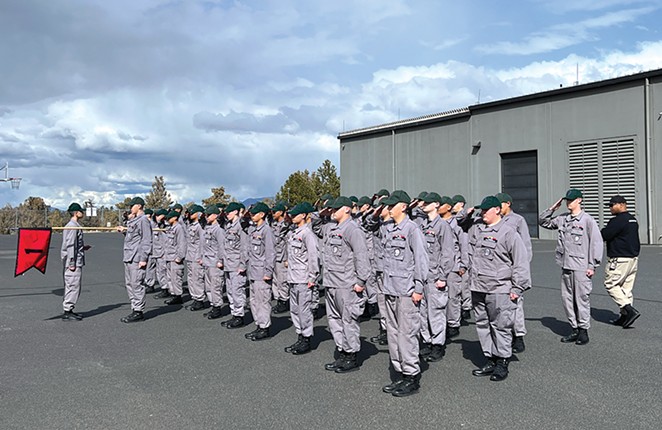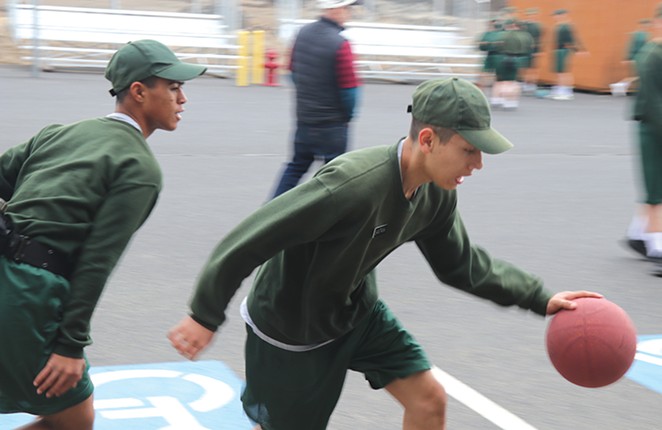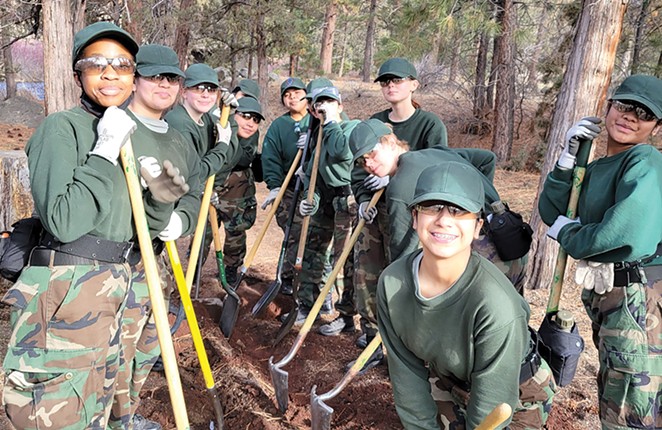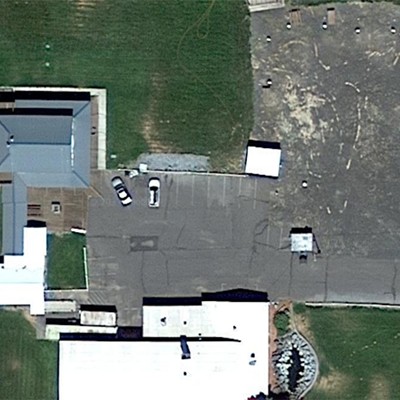Cadets wake up at 6 am sharp, make their beds, recite the "eight core components," gather their gear, quickly eat breakfast and then get dressed and ready for the day. Their time is spent in training — instruction in a classroom, physical fitness and then practice marching in formation. At the end of a highly structured and regimented day, cadets go to sleep in their barracks after Taps is played over the loudspeakers. This isn't a military bootcamp; it's a quasi-military school sandwiched between the Badlands and Bend.

The National Guard started the Youth Challenge Program in the early 1990s. The 17-month program consists of a five-month residency phase. Afterward, cadets' progress is tracked through their selected mentors. The cadets are between 15 and 18 years old, they're behind in school and often have compounding behavioral issues.
"There's a wide variety of what their background is, but they're struggling in mainstream high school for a variety of different reasons. That can be problems with their home life. That can be problems with peer-to-peer interaction, substance abuse, gang activity, it's not a large portion but it's there. The mainstream school system is just not working out for them for many, many reasons," said Steve Wolfe, the company commander for half of the 130 cadets.
The cadets aren't here strictly by parental mandate; each child enters the program voluntarily. Cadet Mikayla Hughes joined the program after a fight with her mother turned physical. She said she wasn't putting effort toward anything, and often skipped school to use drugs. She's only been in the program two months, but there's been a difference. During one of the parental visitations, her mother — who just months prior called the police on her daughter and said she doesn't feel safe with her in the home — beamed at her daughter's accomplishments.
"When I saw her, I was just telling her everything and how I had made it onto Color Guard and that I had good grades. And the look on her face when she heard me say that stuff was just amazing. And hearing her say how proud of me she was, it's great. And it makes you want to push yourself harder when you come back to graduate, and show that you have the determination to better yourself," Hughes said.
Cadet Riley Buell dropped out of high school his freshman year and spent the next year skateboarding, smoking, drinking and partying. After his parents divorced, he did more risky behavior and wouldn't come home a lot of nights. He went back to school his sophomore year, but learned about the program from his grandfather. He said he's become more respectful, found role models in the Cadres — who supervise the students — and has grown an appreciation for volunteer work, which cadets do weekly.
"At the beginning of this program, I didn't believe in myself, I wanted to quit immediately. But as time progressed, and we got through this, the weeks of red stage (weeks one and two), I started realizing that this program is definitely a really beneficial thing for me," Buell said.
Some cadets' school issues stem from trauma, like Cadet Rafael Calles, whose tardiness at school stemmed from survivor's guilt he felt after a car crash permanently injured his two friends. Before that he was going to school and getting passing grades, but he just couldn't focus anymore. Calles, like other students interviewed, said what makes schooling here different is the intense focus demanded of students and the individualized education plans.
"There are no distractions, no phones, kids that are misbehaving get sent out. I can focus here and it just took a long time of just reflecting, like, life still moves on after an accident like that, and I need to get back on track to where I was," Calles said.
The program
The first two weeks of the program are usually the hardest. Kids who often come from homes with little structure are suddenly engrossed in a military-style hierarchy with strict codes of conduct, and that can be a difficult adjustment. The deafening sir-yes-sirs, the forceful march to and from classes and being away from home can all cause distress in the first few weeks.
"When they first come in the doors, that culture shock, that environment change, creates a lot of anxiety, it creates homesickness, and most of these kids haven't been away from their home for an extended period of time," Wolfe said.
That's when most of the cadets exit the program. The school is free for students, so parents won't be strapped for cash if their kid exits — but similar, private intervention programs can be prohibitively expensive. School staff will try and convince the kids to stay, but if the cadets consistently request to leave, they'll be allowed to. Some cadets who want out will just break a rule that results in expulsion. For less severe incidents, cadets get a verbal warning. If they continuously violate a program rule or standard, they'll get a disciplinary action report. If they continue getting written up for violations, it could lead to loss of points on their grades, additional physical training, extra jobs, mandatory essays and even dismissal, if the director finds it necessary after hearing evidence during a review of infractions.
"The administrative review is made up of every department here, academics, post residentials, admissions, we even bring in some people that have no knowledge, they're just outsiders taking on information. We'll bring them into a room with those people and then we'll ask them a lot of questions and try to figure out the why. Why is this happening? Is this kid a safety risk to others? Are they impeding the success of others? Do they want to be here?" Wolfe said.
The schooling portion of the program is individually tailored based on the credits the cadets are lacking — someone who failed math but is up to date on other subjects will have math-intensive instruction. There are no Cs here; anything below an 80% grade is a no-pass. Once completed, Cadets can recover 8 to 10 credit hours, which is essentially a year and a half of credits in a traditional high school.
"We're super focused, we're very goal oriented, we know we only have the five and a half months, every student has to get an 80% on every assignment. And every class, they can't not turn things in," said careers and personal finance teacher James Walker. "The reason that we have you in this military structure is we have a lot to do in a short time. And that's just the most efficient way to get it done."
Many of the staff members are former members of the military, but the school isn't designed to funnel students into it. About 3% of the cadets in the latest graduating class went onto a career in the military. Walker said he promotes community college and trade school on a lot of his students. A lot of the students have never held a job, and can come out of the program with a resume just from their time at OYCP.
"We're going to put down their volunteer work on their resume. Also, a lot of them have held leadership positions in this building, be it in laundry or working on the kitchen or whatever. And we'll certainly put that on their resumes as well — I want to give them credit for what they did," Walker said.
The outcomes
Students choose a mentor at the beginning of the program from someone they know back home. Cadets correspond with their mentor throughout the residential phase, and the mentors track their progress and relate it back to the OYCP after graduation. Case Manager Connie Morgan said at the six-month mark from the last class, about 96% of students are either working or in school for at least 25 hours a week.
"Because the kids are here and they change every single thing about their lives — they change their routine, their diet, their physical fitness, their positive mindset — when they leave here, they feel so good about themselves. They're on top of everything. But when they go home, nothing changed at home. So that's when the real work begins, seeing how successful were we planting something that's going to keep growing inside them?" Morgan said.
MDRC, a nonprofit education and social policy thinktank, found that graduates of National Guard Youth Challenge programs are 17% more likely to obtain a high school diploma or a GED than a control group of high school dropouts. They were also slightly more likely to be employed, and on average earned about 20% more than their counterparts in the control group. However, the study also found almost no difference on measures of crime and delinquency.
Jasmine Troncoso graduated from the program 17 years ago, and has since become an attorney. She dropped out of high school at 15 years old, was using drugs, had been arrested and had an unsafe home environment where she faced sexual abuse, she told the Source Weekly. She credits the program with changing her life, and she's since worked as a Deschutes County Assistant District Attorney and is now a family law attorney specializing in child custody and stalking and restraining orders. In 2021, Troncoso also settled her own suit alleging racial and sexual discrimination at the Deschutes County DA's office.
Troncoso said that some people may leave the Youth Challenge program and not achieve four-year degrees, but that it's almost always a net benefit on a person's life.
"Some people out there today, they're on a trajectory to end up in prison. I have girls that I graduated with that are struggling, but that's better than prison. Then we have people who are on a trajectory to maybe just graduate from community college who went to a four-year college and are now doing advanced degrees. It just depends; everybody's in a better situation than they would have been," Troncoso said.

Jaquince Jesse graduated last year and is now just a half credit of math and science away from graduating high school. He enrolled in the program with his best friend, hoping it'd help them graduate high school on time and change their lifestyles. After high school, he plans on joining the National Guard and then enrolling in college.
"It really, it gives you a perspective on life. And it just kind of helps you find who you really are and refocus you. It also helped me find out about careers in the future. I was always in a stuck position where I felt like I didn't know what the heck I want to do, and I still don't know exactly what I want to do, but I feel like it's pushed me forward just a little bit," Jesse said.
Though a military structure can seem harsh for a teenaged population, people working there say to look at the results. The program focuses on at-risk youth and can be effective in putting them on a different path in life. Cindi Krauger, the principal of the OYCP, says the structure happens due to the high expectations on students.
"The expectation here is hard, because they're always pushed to see where their limit is. As long they're giving 100%, that's really all isn ever expected out of them. I don't think that's too harsh. We want them to see their potential and also for them to really feel it themselves," Krauger said.

























